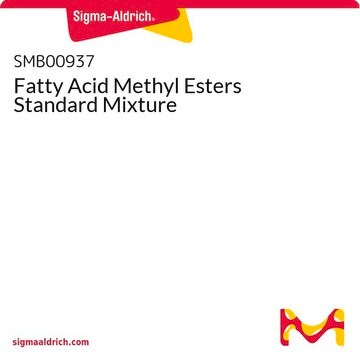89764
Undecanoic acid
analytical standard
Synonym(s):
Hendecanoic acid
About This Item
Recommended Products
grade
analytical standard
Quality Level
Assay
≥99.0% (GC)
shelf life
limited shelf life, expiry date on the label
technique(s)
HPLC: suitable
gas chromatography (GC): suitable
bp
228 °C/160 mmHg (lit.)
248-250 °C (lit.)
mp
28-31 °C (lit.)
application(s)
cleaning products
cosmetics
flavors and fragrances
food and beverages
personal care
format
neat
functional group
carboxylic acid
shipped in
ambient
storage temp.
room temp
SMILES string
CCCCCCCCCCC(O)=O
InChI
1S/C11H22O2/c1-2-3-4-5-6-7-8-9-10-11(12)13/h2-10H2,1H3,(H,12,13)
InChI key
ZDPHROOEEOARMN-UHFFFAOYSA-N
Looking for similar products? Visit Product Comparison Guide
Related Categories
General description
Application
Storage Class Code
11 - Combustible Solids
WGK
WGK 1
Flash Point(F)
>233.6 °F
Flash Point(C)
> 112 °C
Personal Protective Equipment
Regulatory Listings
Regulatory Listings are mainly provided for chemical products. Only limited information can be provided here for non-chemical products. No entry means none of the components are listed. It is the user’s obligation to ensure the safe and legal use of the product.
JAN Code
89764-VAR-F:
89764-250MG-F:
89764-1G-F:
89764-BULK-F:
Choose from one of the most recent versions:
Already Own This Product?
Find documentation for the products that you have recently purchased in the Document Library.
Customers Also Viewed
Our team of scientists has experience in all areas of research including Life Science, Material Science, Chemical Synthesis, Chromatography, Analytical and many others.
Contact Technical Service












